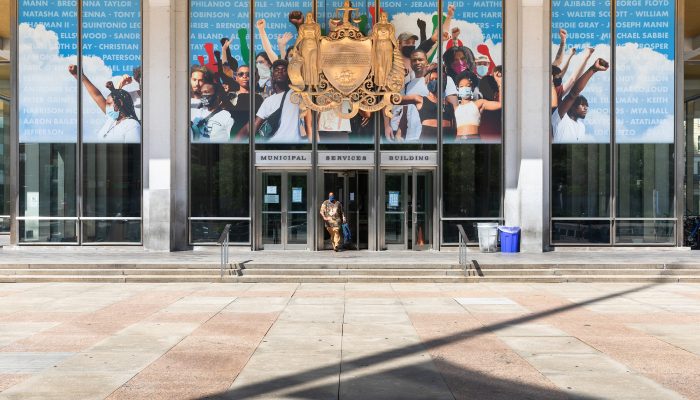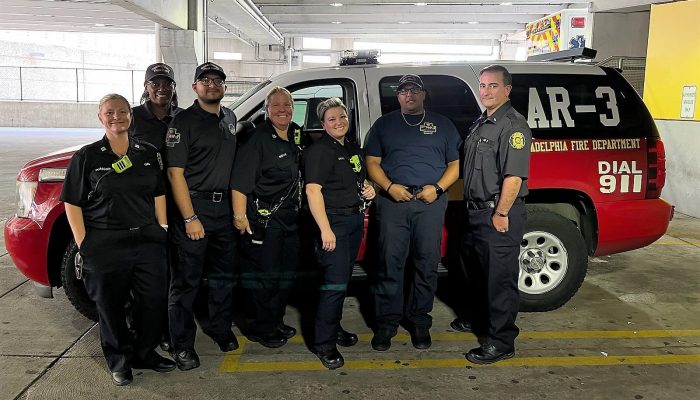Tuesday, October 26, marks one year since the tragic death of Walter Wallace, Jr. As we approach this date, we acknowledge the deep trauma that his family—and all of Philadelphia—went through over the past year.
Mr. Wallace, Jr.’s death, along with last year’s protests, underscored the urgency of many important reforms such as mental health training and crisis response resources. Over the past year, the City has worked together with institutions, departments, community leaders, and organizations to enact meaningful reforms, reimagine public safety, and advance racial justice—and this critical work continues.
Resources available
We know this may be a difficult time for many people. There are resources available:
Mental health resources
Remember that if you are in crisis, we strongly urge you to call the Philadelphia Crisis Line at 215-685-6440. This hotline operates 24/7 and has behavioral health specialists ready to respond to those in need of immediate help. Additional resources are available:
- Boost Your Mood is a resource guide from DBHIDS/Healthy Minds Philly that has wellness and mental health tips for everyone. Boost Your Mood was created to acknowledge the uncertainty and stress many are experiencing as a result of the prolonged COVID-19 pandemic, civil unrest, racially motivated incidents of violence, and the trauma associated with gun violence. Boost Your Mood makes it easier for people to talk about mental health and access free services and supports the city makes available. The site also has a guide to addressing trauma and violence (PDF), which provides information about community support in the face of trauma.
- Philadelphia Department of Behavioral Health and Intellectual disAbility Services has many resources related to mental health and substance abuse.
- Black Men Heal provides mental health and community resources for Men of Color.
- MindPHL provides free mental health resources and programs from the City of Philadelphia in collaboration with Independence Blue Cross.
- Healthy Minds Philly has a guide to Addressing Trauma and Violence which provides information about community support in the face of trauma.
Black Male Resource Finder
The Mayor’s Office of Black Male Engagement recently launched the Black Male Resource Finder, for Philadelphia residents to access City and community resources digitally. This finder has contact information of City agencies, Black-owned businesses, community organizations, programs, services, resources, and community stakeholders that provide support for Black males in Philadelphia. It includes information on workforce opportunities, legal services, health and wellness resources, fatherhood and parenting supports, community anti-violence groups, and much more.
Reforms in progress
In the summer of 2020, the City started the Pathways to Reform, Transformation and Reconciliation Steering Committee to both acknowledge the pain and outrage of communities of color and the urgency to make real systemic changes that build a more equitable city for all Philadelphians. Since then, we continue to institute reforms that aim to make City policies racially equitable, fair, and transparent. The City can and will do better in addressing Philadelphia’s inequities in our criminal justice and health systems.
The Philadelphia Police Department (PPD), the Department of Behavioral Health and Intellectual disAbility Services (DBHIDS), and the Office of Criminal Justice have been working to expand and build upon collaborative programs that had been established prior to the shooting of Walter Wallace, Jr. as part of longstanding reform efforts within the City.
Embed DBHIDS staff to support 911 call operators in identifying signs of a behavioral health crisis.
Since September 28, 2020, a DBHIDS crisis navigator has been stationed with staff in the police 9-1-1 call center to learn about the types of calls received—gathering information to refine the model for behavioral health collaboration, determine the amount and type of support needed, assist in the development of a curriculum for training of call operators, and help in the development of a script to support identification of crisis calls. A second crisis navigator was added to assist in late December 2020. During the pilot phase of this program, crisis navigators are available to support between 8 a.m. – 3 p.m.
The goal is to build a system that better identifies when someone is calling 9-1-1 in relation to a behavioral health crisis, and to triage calls to the right resources in the community. In early 2022, these crisis navigators will be able to support call operators as they speak with people in behavioral health crises, actively de-escalate situations over the phone, provide follow-up that connects callers to services in the community, and help identify when a behavioral health response, police response, or co-response is needed. Upon expansion, they will also be available in the 9-1-1 call center on a 24/7 basis to support people calling from across the City.
Provide behavioral health screening questions for 911 call operators.
As of November 3, 2020, 911 call operators now have a script comprised of a series of questions to better identify when a person is calling related to a behavioral health crisis. The responses are provided to dispatchers and officers responding in real-time. With these new screening policies, call operators will have the ability to gather more information and will improve the way they dispatch officers, co-responder teams, and other first responders within the city. The script was updated in April 2021 to incorporate feedback from the call-takers, community advisers and other stakeholders. Another round of revisions to the script are being planned for early 2022 to align with the expansion of the Philadelphia Crisis Line and the community mobile crisis response teams, to ensure that behavioral health resources are dispatched to the appropriate calls in real-time.
Conduct a modified Crisis Intervention Team (CIT) class for 911 call takers and dispatchers.
Since November 2020, the Crisis Intervention Team curriculum has been modified and delivered to 911 call operators and dispatchers. This training helps call operators identify crisis-related calls so that they can be more efficiently directed to CIT trained officers, co-responders, or another first response option. Additionally, the Crisis Intervention Team curriculum provides de-escalation training that can be used for both 911 call operators and dispatchers. The planning for this training has been underway since late August 2020. As of August 2021, 90 percent of the radio room staff have been CIT trained.
Implement Expanded Community Mobile Crisis Response Services.
Since mid-2020, a plan has been underway to expand Community Mobile Crisis Response Services. This is focused on increasing non-police response to behavioral health crises, engaging communities with an emphasis on trauma reduction, and reducing unnecessary emergency department and inpatient psychiatric visits.
DBHIDS is implementing a Community Mobile Crisis Response Team (CMCRT) model that incorporates some of the approaches utilized by other cities and builds on the community focus specific to Philadelphia. The mobile crisis response team is dispatched to assist with de-escalating and stabilizing non-violent crisis situations and link individuals to appropriate behavioral health and social service supports.
DBHIDS has been working intensively on the new approach to community mobile response to behavioral health crises. By expanding current provider capacity, increasing to four providers and engaging in training to support the Philadelphia model of community mobile response to behavioral health crises, DBHIDS’ program development is on track. The Philadelphia model establishes four regions for increased community responsiveness, and includes crisis intervention specialists, medical professionals and people with lived experience. The overall efforts at building the capacity in the behavioral health arena to reduce police involvement in behavioral health crises whenever possible has required an integrated, interagency coordinated effort which is well underway.
The number of embedded navigators within the 911 radio room and the number of call takers on the Philadelphia Crisis Line have been and will continue to be expanded to create the capacity to receive calls, triage them, and dispatch the appropriate first responders. A Learning Collaborative for the expanded provider teams will kick off in the fall with on-the-ground roll out of this new regionalized model anticipated early 2022.
Pilot co-responder model, Crisis Intervention Response Teams (CIRT).
In spring 2021, the City began its pilot of the Crisis Intervention Response Team Program. This pilot program consists of four co-responder teams that can serve as first responders for people in behavioral health crisis on a single shift. The CIRT Units are composed of a CIT trained police officers and mental health professionals contracted by DBHIDS, that jointly respond to calls identified by Police Radio or patrol officers.
The Behavioral Health provider also supports two peer-based follow-up teams that provide support to people being served by the CIRT Units and connect them in real time to services and support in the community. This effort accelerates plans that have been in development since 2019. PPD, DBHIDS, and MDO developed a proposal to add more teams to build towards 24/7 coverage across the city by the early 2022, based on information gathered in the pilot stage. All of the CIRT Units will be housed in a newly established Behavioral Health Unit within the Police Department in early 2022 that will provide specialized supervision, training, and coordination with other teams responding to people in behavioral health crises in the City.
Expand CIT officer training.
Crisis Intervention Team (CIT) Training is a model whereby officers receive 40 hours on how to better handle mental health and crisis related incidents. It involves how to identify such incidents, how to deescalate safely and uses active role playing to reiterate the training. The CIT Coordinator, who works between the PPD and DBHIDS, serves as a bridge between law enforcement and the behavioral health system to connect services to people in crisis as well as their families.
Currently there are 3,555 CIT trained officers. More than 50 percent of PPD officers are CIT trained and are assigned throughout the city on all tours of duty. Philadelphia has made a significant investment in CIT officer training and is a national leader for having the largest cohort of CIT officers in a major city police department. The goal is to have all patrol officers receive CIT training.
A.B.L.E. officer training.
PPD continues to implement the Active Bystander for Law Enforcement (ABLE) Program, designed to increase internal accountability and train officers on ways to actively and effectively intervene and de-escalate situations. Currently, there are more than 800 PPD personnel trained with a projection to have approximately 1,400 trained by the end of 2021.
De-Coupling CIT and Taser Training.
The City signed a contract to pay for the purchase and training of tasers for all uniformed police officers. Prior PPD policy required officers to receive 40 hours of CIT training in addition to eight hours of TASER training before being issued a taser device. Due to the time constraints of CIT training as well as the limited number of class spots available, the PPD continues to expedite the availability of taser devices into the field through decoupling. Through this pilot, the last four Police Academy classes were issued tasers after receiving the eight hours of required training. De-coupling CIT and Taser training will allow current PPD officers an expedited use of tasers and allow CIT training to be scheduled without delay.
Reforms in the latest FOP contract.
The latest contract with the Fraternal Order of Police, approved in September 2021, included critical reforms that seek to make the police discipline process more transparent and accountable, including modifications to the arbitration process and incorporating civilians into the disciplinary process in key ways. The contract modifies the discipline code and process for officers who are alleged to have engaged in misconduct, increasing accountability and transparency. Changes to the FOP contract include:
- Revisions to the discipline code to increase the time that discipline remains on an officer’s record, increase penalties for a number of offenses, and add new offenses, including prohibiting officers from fraternizing with members of hate groups.
- Allowing individuals outside the bargaining unit to determine the disciplinary charges to be brought against officers.
- Allowing the Police Commissioner to use non-sworn or even outside advocates to present the Department’s case at the Police Board of Inquiry (PBI), which reviews evidence and evaluates whether the officer is guilty of the identified charges.
- Reforming the composition of the PBI panels to add non-sworn personnel, or even non-City employees, to each panel and remove the officer of the same rank; currently, the PBI is made up of one officer of the same rank and two officers of higher rank.
While the reforms and updated policies are a significant step forward, the City remains committed to ensuring that all Philadelphians have the safety and supports they deserve. We know we have a long way to go to making our city the best, fairest, and most equitable that it can be.



